
Prostate Cancer (PSA) Test
Prostate cancer is a common cancer in men. The prostate-specific antigen (PSA) test measures the level of PSA in the blood. Elevated levels of PSA in the blood could indicate the presence of cancer, but could also indicate an infection or an enlarged prostate.
The wide availability of PSA screening has meant that many prostate cancers are now found earlier and can be treated more effectively, but PSA testing is only the first step when prostate cancer is possible, so please discuss your screening results with your doctor.
About Prostate Cancer and the Prostate-Specific Antigen (PSA) Test
The prostate gland is a male reproductive organ positioned just below the bladder. In addition to assisting in semen production, the prostate produces a protein called prostate-specific antigen, which circulates in the blood, whether or not there is cancer in the prostate.2 The PSA test is a blood analysis that measures how much prostate-specific antigen is in the blood. Sometimes a higher than expected PSA level in the blood can indicate cancer, which can then be confirmed with further prostate testing.
Prostate cancer is common; it is the second most common type of cancer in men (behind skin cancer).1 About 175,000 men in the U.S. will be diagnosed with prostate cancer this year, but the death rate from this disease has dropped by more than half since 19931, driven by advances in testing and research. Many men with early-stage prostate cancer experience no symptoms, which is why it is so important for men in the high-risk groups to discuss the benefits of receiving a prostate test with their doctor.
Despite clear evidence that PSA testing has contributed to lowering the death rate from prostate cancer,3 PSA testing by itself is not an indication of cancer. There are other conditions that can cause elevated PSA levels, including an enlarged prostate or infection.
Higher than expected PSA levels in the blood will most likely lead to your physician taking additional steps: conducting a complete physical, including a digital rectal exam (DRE). If the DRE reveals that the prostate is enlarged or has any hard lumps, the doctor may order a biopsy or diagnostic ultrasound. The biopsy procedure will remove cells from the prostate to be analyzed under a microscope. If prostate cancer is found, it is given a Gleason score, which estimates the likelihood that the cancer will grow and/or spread to neighboring tissue. A low Gleason score (six or below) indicates the cancer is less likely to spread.3 Many forms of prostate cancer are slow growing, and unlikely to ever cause symptoms or spread outside the prostate. In these cases, doctors often will not recommend any treatment. Some prostate cancer treatments significantly impact quality of life, causing erectile dysfunction, incontinence and other problems. Your doctor can help you determine your best course of action based on the results of your tests.
Prostate Cancer Screening Details
The prostate cancer test is actually a finger-stick blood sample used to measure the amount of prostate-specific antigen (PSA) in the blood. Prostate-specific antigen is measured in nanograms per milliliter (ng/mL), and the expected level varies by age group. Your prostate testing results will indicate if the PSA level in your blood is Normal or Abnormal. A normal prostate test result is 4.0 ng/mL and below, while 4.1 ng/mL or higher is considered abnormal. Your results letter will also indicate if you should follow-up with your personal physician for further discussion regarding your PSA test results.
Warning Signs for Prostate Cancer
- Difficulty with urination
- Blood in the urine
- Impotence
- Bone pain in hips, spine and ribs
- Nerve pain, muscle weakness and numbness in the feet
Risk Factors for Prostate Cancer
- Men ages 50-69
- African-American ethnicity
- First degree family members having a history of prostate cancer (father, brother, son)
Who is the PSA test for?
Prostate cancer screening testing is recommended for:
- Men aged 50-69 who are at average risk for the disease
- Men who are 45+ years of age and at higher risk for developing prostate cancer either because they are African-American or they have a father, brother, or son diagnosed with prostate cancer before age 65
- Men who are 40+ years of age with multiple first-degree relatives (father, brothers and/or sons) who have been diagnosed with prostate cancer. This is the highest risk group.
Ages
Men ages 40-69 should consider getting a prostate screening, especially those men with any of these two risk factors: having family members who have been diagnosed with prostate cancer, and African-American men.
Frequency
Men ages 40-69 should discuss with their personal physician the frequency of prostate testing they are comfortable with. This conversation should take into consideration your age, your risk factors, and your personal feelings about preventive screening, as well as what next steps you are comfortable with, should your prostate test results indicate elevated PSA levels in your blood.
Schedule this Screening
*Screening availability may be limited by location.
Prostate Cancer Screening FAQ
The prostate-specific antigen (PSA) test is only one step to confirm a diagnosis of prostate cancer. If the blood analysis indicates elevated PSA, the doctor’s next step will further prostate testing, including a digital rectal exam (DRE), followed by an ultrasound-guided prostate biopsy if indicated. A biopsy will definitively confirm the diagnosis, and then treatment options can be considered.
Relevant Tests
1. American Society of Clinical Oncology, cancer.net, January 2019, https://www.cancer.net/cancer-types/prostate-cancer/statistics
2. Mayo Clinic, https://www.mayoclinic.org/tests-procedures/psa-test/about/pac-20384731
3. Memorial Sloan Kettering Cancer Center, Prostate Cancer Screening Guidelines, https://www.mskcc.org/cancer-care/types/prostate/screening/screening-guidelines-prostate
4. Memorial Sloan Kettering Cancer Center, Prostate Biopsy Procedure, https://www.mskcc.org/cancer-care/types/prostate/diagnosis/prostate-biopsy


